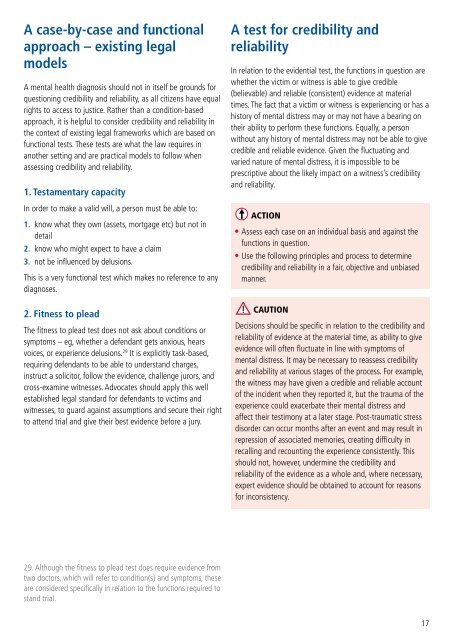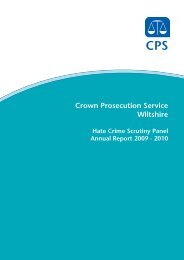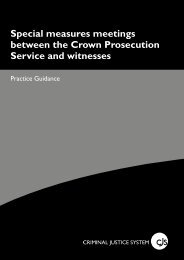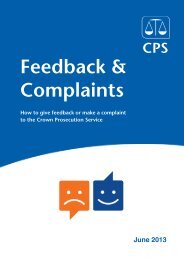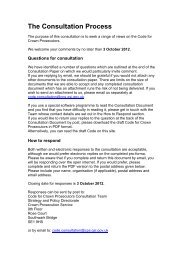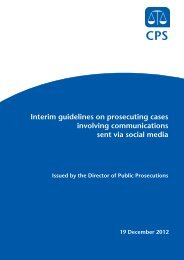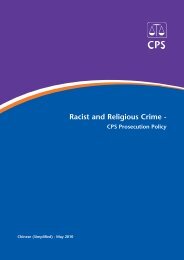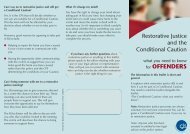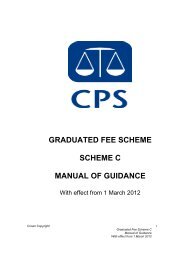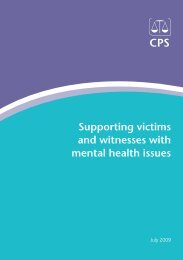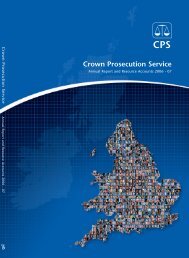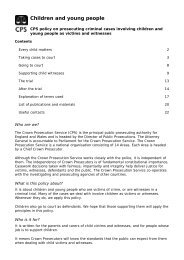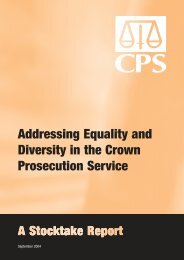As prosecution guidance clearly states, ‘credibility or reliabilityshould only be questioned in the same circumstances as <strong>for</strong>any other witness’, 22 that is, if something particular comesto light which calls their evidence into question, or somethingin the witness’s presentation – such as inconsistencies,discrepancies or evasion – undermines their account.Decisions about the evidential test should never be takensolely because of the existence of <strong>mental</strong> <strong>distress</strong> or aparticular condition, as recent case law confirms (see casestudy below). Where specific evidence or behaviour doesdetract from the account of the witness, prosecution decisionsshould be taken as they would <strong>for</strong> a witness <strong>with</strong>out <strong>mental</strong><strong>distress</strong>, while considering whether support would help thewitness to give their best evidence. 23DefinitionsIt is important to distinguish between credibility, reliability,competence <strong>and</strong> capacity, which may all have an impact ona witness’s ability to give evidence, but <strong>with</strong> very differentimplications. These are separate issues <strong>and</strong> shouldbe considered against their appropriate legal frameworks.Crucially, <strong>mental</strong> <strong>distress</strong> is distinct from <strong>mental</strong>capacity <strong>and</strong> a link between the two should neverbe assumed.Credibility – is the witness’s testimony believable?Reliability – is the witness’s testimony consistent? For moreon credibility <strong>and</strong> reliability, see appropriate decision-makingprocesses outlined in this section <strong>and</strong> in relevant prosecutionguidance. 24Competence – can the witness underst<strong>and</strong> questions <strong>and</strong> beunderstood? See section 53 Youth Justice <strong>and</strong> CriminalEvidence Act 1999. 25Capacity – does the witness have capacity to take decisionsin their best interests? See Mental Capacity Act 2005 <strong>and</strong>related Code of Practice. 2622. CPS (2010), Victims <strong>and</strong> <strong>witnesses</strong> who have <strong>mental</strong> healthissues <strong>and</strong>/or learning disabilities: Prosecution Guidance,‘Credibility <strong>and</strong> reliability’23. See p.25-7 ‘Using expert evidence’ on when <strong>and</strong> how it isappropriate to seek further advice to in<strong>for</strong>m decisions.24. CPS (2010), Victims <strong>and</strong> <strong>witnesses</strong> who have <strong>mental</strong> healthissues <strong>and</strong>/or learning disabilities: Prosecution Guidance,‘Credibility <strong>and</strong> reliability’25. http://www.opsi.gov.uk/acts/acts1999/ukpga_19990023_en_126. http://www.dca.gov.uk/legal-policy/<strong>mental</strong>-capacity/mca-cp.pdfCase study: poor practice by theprosecution (FB v DPP) 27FB was a victim of assault whose case was dropped byprosecutors in 2007 on the grounds that he had schizophrenia<strong>and</strong> was there<strong>for</strong>e an unreliable witness. This decision reliedon a condition-based assessment <strong>and</strong> expert evidence whichgeneralised about the impact of schizophrenia on FB’s“reliability as a witness of the truth”. In 2009 the High Courtfound the CPS to be in breach of article three of the EuropeanConvention on Human Rights <strong>for</strong> failing to uphold the state’sduty to protect people from inhuman or degrading treatment,by denying FB the right to see his assailant tried in court. Thejudge stated:“The conclusion that [FB] could not be put <strong>for</strong>wardas a credible witness, despite the apparent factualcredibility of his account, suggests either amisreading of Dr C’s report (as though it had said thatFB was incapable of being regarded as a crediblewitness) or an unfounded stereotyping of FB assomeone who was not to be regarded as credible onany matter because of his history of <strong>mental</strong> healthproblems. For those reasons I conclude that thedecision to terminate the prosecution was unlawful.”Case study: poor practice by thedefence 28In a case heard in 2009, an eyewitness to an offence ofwitness intimidation had a diagnosis of schizophrenia. TheCrown had applied <strong>for</strong> special measures <strong>and</strong>, in so doing, hadmentioned his symptoms which included hallucinations. Thedefence line of questioning raised the issue of his <strong>mental</strong>health condition, not specifically in relation to the incident inquestion, but as a general proposition to undermine hisreliability. A prosecutor involved in the case said:“While giving his evidence the defence encouragedhim to agree that he often saw images which werenot real. As far as the court was concerned, he couldnot be treated as a reliable witness but in reality hiscondition had been used to exploit his evidence.”27. R (on the application of B) v DPP (2009) EWHC28. This case was reported to Mind as part of survey research toin<strong>for</strong>m this toolkit <strong>and</strong> steps have been taken to protectanonymity.16
A case-by-case <strong>and</strong> functionalapproach – existing legalmodelsA <strong>mental</strong> health diagnosis should not in itself be grounds <strong>for</strong>questioning credibility <strong>and</strong> reliability, as all citizens have equalrights to access to <strong>justice</strong>. Rather than a condition-basedapproach, it is helpful to consider credibility <strong>and</strong> reliability inthe context of existing legal frameworks which are based onfunctional tests. These tests are what the law requires inanother setting <strong>and</strong> are practical models to follow whenassessing credibility <strong>and</strong> reliability.1. Testamentary capacityIn order to make a valid will, a person must be able to:1. know what they own (assets, mortgage etc) but not indetail2. know who might expect to have a claim3. not be influenced by delusions.This is a very functional test which makes no reference to anydiagnoses.2. Fitness to pleadThe fitness to plead test does not ask about conditions orsymptoms – eg, whether a defendant gets anxious, hearsvoices, or experience delusions. 29 It is explicitly task-based,requiring defendants to be able to underst<strong>and</strong> charges,instruct a solicitor, follow the evidence, challenge jurors, <strong>and</strong>cross-examine <strong>witnesses</strong>. Advocates should apply this wellestablished legal st<strong>and</strong>ard <strong>for</strong> defendants to <strong>victims</strong> <strong>and</strong><strong>witnesses</strong>, to guard against assumptions <strong>and</strong> secure their rightto attend trial <strong>and</strong> give their best evidence be<strong>for</strong>e a jury.A test <strong>for</strong> credibility <strong>and</strong>reliabilityIn relation to the evidential test, the functions in question arewhether the victim or witness is able to give credible(believable) <strong>and</strong> reliable (consistent) evidence at materialtimes. The fact that a victim or witness is experiencing or has ahistory of <strong>mental</strong> <strong>distress</strong> may or may not have a bearing ontheir ability to per<strong>for</strong>m these functions. Equally, a person<strong>with</strong>out any history of <strong>mental</strong> <strong>distress</strong> may not be able to givecredible <strong>and</strong> reliable evidence. Given the fluctuating <strong>and</strong>varied nature of <strong>mental</strong> <strong>distress</strong>, it is impossible to beprescriptive about the likely impact on a witness’s credibility<strong>and</strong> reliability.Action• Assess each case on an individual basis <strong>and</strong> against thefunctions in question.• Use the following principles <strong>and</strong> process to determinecredibility <strong>and</strong> reliability in a fair, objective <strong>and</strong> unbiasedmanner.CAUTIONDecisions should be specific in relation to the credibility <strong>and</strong>reliability of evidence at the material time, as ability to giveevidence will often fluctuate in line <strong>with</strong> symptoms of<strong>mental</strong> <strong>distress</strong>. It may be necessary to reassess credibility<strong>and</strong> reliability at various stages of the process. For example,the witness may have given a credible <strong>and</strong> reliable accountof the incident when they reported it, but the trauma of theexperience could exacerbate their <strong>mental</strong> <strong>distress</strong> <strong>and</strong>affect their testimony at a later stage. Post-traumatic stressdisorder can occur months after an event <strong>and</strong> may result inrepression of associated memories, creating difficulty inrecalling <strong>and</strong> recounting the experience consistently. Thisshould not, however, undermine the credibility <strong>and</strong>reliability of the evidence as a whole <strong>and</strong>, where necessary,expert evidence should be obtained to account <strong>for</strong> reasons<strong>for</strong> inconsistency.29. Although the fitness to plead test does require evidence fromtwo doctors, which will refer to condition(s) <strong>and</strong> symptoms, theseare considered specifically in relation to the functions required tost<strong>and</strong> trial.17


